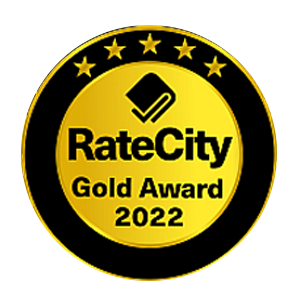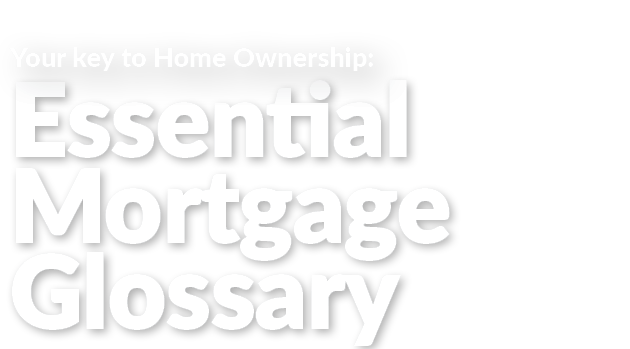Boost your homeownership journey with knowledge
Understanding Mortgage Terms
Boost
With a clear understanding of mortgage terms, you'll feel more confident when discussing your home loan options with lending specialists.Make
Informed Decisions
Knowledge is power. The more you understand, the better decisions you can make about your home loan. Streamline the Application Process
Familiarity with home loan terms can streamline your application process, saving you time and reducing stress.Optimise
Loan Selection
A thorough understanding of mortgage terms can help you better evaluate and optimise your loan selection, ensuring you choose a home loan that best suits your financial situation. Dive right into the terms you need or see the full list below
Mortgage Glossary:
Decoding The Jargon
Amortising loan
An amortising loan, often referred to as a standard principal and interest loan, is a type of loan where you gradually reduce the initial amount borrowed and the interest accrued on it through regular payments over a set period. This type of loan is common in mortgages where the goal is to completely pay off the loan by the end of the term.
____
Arrears
When you’re in arrears, you have missed one or more scheduled payments and are overdue in repayments. This situation can negatively impact your credit score and potentially lead to penalties or increased interest rates. It’s crucial to avoid going into arrears to maintain a good financial standing. If you have concerns about how much you can pay, try our budget planner calculator.
____
Asset
Assets are items or properties that you own, which hold monetary value. This includes cash, real estate, stocks, and other types of investments. Assets play a significant role in financial planning and loan applications, as they can be used as collateral to secure loans.
____
Bona-fide
In the context of finance and legal agreements, bona-fide refers to anything that is genuine and conducted in good faith. A bona-fide agreement or transaction is legitimate, transparent, and free from any intent of deceit or fraud.
____
Break cost
Break costs are fees that a lender charges if a loan is paid off in full before the end of its term. These costs are meant to compensate the lender for the interest they would have otherwise received if the loan had continued as initially agreed. They are often included in the terms of fixed-rate loans.
____
Bridging finance
Bridging finance is a short-term loan used to cover the gap between buying a new home and selling an old one. This type of finance is particularly useful when there’s a timing mismatch between the sale of your old property and the purchase of a new one.
____
Budget
A budget is a comprehensive overview of your income and expenses. It provides a clear picture of your financial status, helping you manage your finances effectively. Creating and adhering to a budget is a key aspect of financial planning, especially when preparing for a significant financial commitment like a mortgage.
____
Capital gains tax
Capital gains tax is the tax you pay on the profit made when selling an investment property. This tax is calculated based on the difference between the property’s purchase price and its selling price. It’s an important consideration when investing in real estate, as it can significantly impact your returns.
____
Cash advance
A cash advance is a short-term loan usually taken out against a line of credit, such as a credit card. These advances often attract higher-than-normal interest rates and are generally used for immediate, short-term financial needs.
____
Certificate of title
A certificate of title is a legal document that provides proof of ownership for a property, whether a home is built, being renovated or under construction. It includes critical details such as the owner’s name, property size, and any mortgages or liens registered on the title.
____
Comparison rate
A comparison rate is a tool used to compare loans on an equal basis. It considers both the interest rate and any fees associated with a loan, providing a more complete picture of the loan’s cost. Use our tool here.
____
Contract variation
A contract variation refers to any changes or alterations to the terms of a contract. These variations must be agreed upon by all parties involved in the contract and are typically documented to prevent future disputes.
____
Conveyancing
Conveyancing is the legal process of transferring ownership of a property from one party to another. This process is usually carried out by a legal representative or a conveyancer and involves several steps, including contract preparation, contract review, and settlement.
____
Creditor
A creditor is a person or organization that lends money with the expectation that it will be repaid, usually with interest. Creditors can be banks, credit card companies, or other types of financial institutions.
____
Credit
Credit refers to an agreement where the borrower receives goods, services, or money now, with the understanding that it will be repaid under set guidelines, typically with an interest charge.
____
Credit report
A credit report is a detailed record of an individual’s credit history. It includes information about past and present credit agreements, payment history, and public records such as bankruptcies or tax liens. We use credit reports to assess a person’s creditworthiness before extending credit. Learn more about credit reporting here.
____
Lender
A lender is a person or organisation that provides money to another party under the agreement that it will be repaid according to set guidelines and terms. Lenders can include banks, credit unions, and other financial institutions. In the context of home loans, lending specialists like Mortgage House provide the funds necessary to purchase a property.
____
Lender’s Mortgage Insurance (LMI)
Lender’s Mortgage Insurance is a one-time insurance premium that protects the lender in the event you default on your mortgage repayments. It is typically required for home loans where the borrower has less than 20% deposit.
____
Liquid assets
Liquid assets are assets that are either in cash or easily convertible to cash. This includes items like savings accounts, stocks, or bonds. These assets can be quickly sold or redeemed for money without losing value, making them an important part of an individual’s financial stability.
____
Loan to Value Ratio (LVR)
The Loan to Value Ratio is a measure of the proportion of the loan compared to the value of the property. For example, if you buy a $500,000 property and need a $350,000 loan, your LVR is 70%. Lending specialists use the LVR to assess the risk associated with a loan. Find out more here
____
Mortgage
A mortgage is a type of loan used for the purpose of purchasing a property. In this arrangement, the property itself is used as security for the loan. If the borrower fails to meet the repayment terms, the lender may take possession of the property. Learn more about mortgages here
____
Mortgage foreclosure
Mortgage foreclosure is a legal process where the lender forces the sale of the property held under the mortgage deed to recoup unpaid monies owed under the terms of the agreement. Foreclosure typically occurs when a borrower defaults on their mortgage repayments.
____
Mortgagee
The mortgagee is the lending institution that provides the funds for a mortgage. In the event of a default, the mortgagee has the legal right to take possession of the property.
____
Mortgagor
The mortgagor is the borrower in a mortgage agreement. This is typically the individual or entity who is purchasing a property using a loan from a mortgagee.
____
National Consumer Credit Protection
The National Consumer Credit Protection Act is Australian legislation that covers consumer protection and consumer rights in relation to credit products and services. It sets out responsibilities for lending specialists and provides protections for consumers.
____
Non-conforming loans
Non-conforming loans are designed for borrowers who find it more difficult to meet the borrowing conditions of standard loans. These might include people with poor credit history, the self-employed, or those who cannot provide the necessary documentation.
____
Offset account
An offset account is a transactional account linked to your mortgage. The balance in the offset account ‘offsets’ the principal of the loan, reducing the overall interest payable. There are different types of offset accounts, including partial offsets where only a part of the balance (for example, 50%) offsets the loan amount. At Mortgage House our loans come with an optional full 100% Offset account. Find out how an offset account works.
____
Ombudsman
An ombudsman is an independent body established within a particular industry to investigate and resolve disputes. They act as an outside party to the dispute, providing an impartial perspective and facilitating resolution.
____
Principal
The principal of a loan is the original amount of capital borrowed. Over time, the borrower repays the principal along with interest. The principal amount does not include any interest or additional fees associated with the loan.
____
Refinance
Refinancing involves switching your loan from one product or lender to another, usually with a better interest rate or conditions. Your initial loan is paid out, and your debt is transferred across to the new product or lender. The process of refinancing is like applying for a purchase mortgage. Learn about refinancing here.
____
Repossess
Repossession is the act of reclaiming possession of goods or assets due to failure to make payments within agreed terms. In the context of mortgages, if a borrower defaults on their payments, the lender has the right to repossess the property.
____
Secured loan
A secured loan is a type of loan where the property being purchased is held as security against the loan. If the borrower fails to repay the loan, the lender can claim the property to recoup their losses. Secured loans often have lower interest rates due to this reduced risk for the lender. Learn about secured vs unsecured loans here.
____
Settlement
Settlement is the day on which the process of changing title of a property occurs. Your legal representative will organise the exchange of money and documents so that you become the legal owner of the property. An online application can simplify the settlement process when refinancing.
____
Unsecured loa
An unsecured loan is a loan in which no property is held as security. These loans generally attract a higher rate of interest due to the increased risk on the part of the lender. Examples of unsecured loans include credit cards and personal loans.
____
Valuation
A valuation is an estimation of the value of a property prepared by an independent professional valuer. Valuations are often used by lending specialists to determine how much they are willing to lend for a property.
____
Variable interest rate
With a variable interest rate, the interest rate will vary depending on several factors, including the Reserve Bank’s current cash rate, and prevailing lender sentiment. You typically follow the same steps for refinancing as you did for your purchase mortgage, whether you’re switching from a fixed rate to a variable rate or vice versa.
____
Vendor
The vendor is the person who is selling the property. In a real estate transaction, the vendor’s responsibilities include providing all necessary disclosures and ensuring the property is in the agreed-upon condition at the time of sale.
Compare Loans Now
Take control of your home buying journey.
Evaluate various home loan options side by side.
Find the perfect match for your needs.


Our Success is Your Success
We continue to achieve industry recognition for excellence in customer service and low-rate loan products. When you come to Mortgage House, know that you are in the safest hands.
We continue to achieve industry recognition for excellence in customer service and low-rate loan products. When you come to Mortgage House, know that you are in the safest hands.



ProductReview.com.au
Home Loans - 2023 Winner


ProductReview.com.au
Best Home Loan Lender 2022

Money Magazine
Best-Value Basic Home Loan(Non-Bank) 2022


RateCity
Best Variable Home Loanfor the Chameleon Executive Home Loan 2022

